a little knowlidg is a good thnig
i've been reading Spiegelman's excellent new edition of Breakdowns: Portrait of the Artist as a Young %@&*!, which was released last October. The 28 huge new pages in this alone are worth the entry price. Artie dedicates it in part to the memory of Woody Gelman, who at one point, in 1977, was to be the original publisher of Breakdowns, which reminds me of a theory I entertained for a while. That is, the significance of Gelman's contribution to the modern 'idea' of comics. Before making my point however, I would have you know that this is no longer an idea that I have faith in. It's an idea that had its day in the world and has given way to a smaller, shrunken situation in which it is difficult to locate any idea. Alan Moore was addressing this state of affairs when he wrote: "I did once feel I was part of a movement that wanted to change comics into something valuable to culture, but I don't really feel that kinship in the way I used to." I do admit that Spiegelman's book almost revives the old enthusiasm, but occasions the thought that this may be a generational thing.
My perception was that it was Gelman who first envisioned comics for the bookshelf and, whether he invented the notion himself, he certainly inspired us with the thought of it. With his Nostalgia Press editions of Flash Gordon in two pleasing clothbound volumes, and particularly the lavish large format Little Nemo (all between 1967 and 1975 approximately), he put in our heads the idea that one of us might one day do something worthy of such a serious presentation. I'd bet that Alan Moore had such a thought when he held them. And I know he could not have failed to have bought them, probably in the same place as I did, Bookends in Camden Town, the only shop I know that imported all this obscure stuff in the early 1970s. This was just one aspect of the multi-faceted concept of what later they were calling the 'graphic novel,' long before we had stalwarts like the following chap to explain it to the world on our behalf:
'Comics 101: What is a Graphic Novel?' by one Adam Relayson- Examiner.com - July 20,
Examiner.com is hardly a site of any authority (in fact I had to go to wikipedia to find out what the hell it is), but the bunch of opinions expressed by this particular citizen journalist are held by a large number of his fellow fans. There was a time when such blather would only be found in xeroxed fanzines and nobody would pay it any attention, but his page turned up for me via a Google news search, not a blog search, while I was investigating Watchmen's DVD reception two days ago. A sensible person arriving at it as I did must wonder how such a load of baloney could ever have come to be. It dents longstanding general knowledge in at least four places, and offends the preposition in two, all of this just within the 'pull-quote.' And it does it while declaring others to be 'ignorant.' Said sensible person might find himself momentarily questioning his or her previously held suppositions about the lately trumpeted value of the so-called 'graphic novel,' or worse, reverting to the earlier held supposition that comics are read by people who are not very bright.
I suppose all pop-culture communities are bound to have their own jargon, but it's very cringeworthy to find fans arguing that the larger society has got it wrong when they themselves have mangled it out of shape in just three or four cultural generations. My inclination is to feel as Alan felt when I quoted him above, and to say: they're not with me; I came in alone.
My perception was that it was Gelman who first envisioned comics for the bookshelf and, whether he invented the notion himself, he certainly inspired us with the thought of it. With his Nostalgia Press editions of Flash Gordon in two pleasing clothbound volumes, and particularly the lavish large format Little Nemo (all between 1967 and 1975 approximately), he put in our heads the idea that one of us might one day do something worthy of such a serious presentation. I'd bet that Alan Moore had such a thought when he held them. And I know he could not have failed to have bought them, probably in the same place as I did, Bookends in Camden Town, the only shop I know that imported all this obscure stuff in the early 1970s. This was just one aspect of the multi-faceted concept of what later they were calling the 'graphic novel,' long before we had stalwarts like the following chap to explain it to the world on our behalf:
'Comics 101: What is a Graphic Novel?' by one Adam Relayson- Examiner.com - July 20,
One of the most common mistakes made in our medium is the confusion of Comic Books with Graphic Novels. This is sort of like referring to a Magazine as a Newspaper; while they may contain similar information, they are entirely different formats.All of the labels that he explains so cleerly and knowledgously, all this misinformation that he sends out into the world, are the end-results of several years of misinterpretation and misunderstanding, every bit of it originating within the comic book collecting community and not outside. A person of any education, while accepting that these labels exist as such within this tiny enclave, would be embarrassed to be asked to promote them to a larger public, where a 'novel' is not a format and 'trade paperback' just means a larger-than-conventional paperback whose name resulted from old-time practices within the book 'trade.' That's what it meant when I was ordering printing only seven years ago and the printer didn't care what you called the stuff inside it, because content and format are completely separate things. It could be recipes or song lyrics or a novel, or a 'graphic novel' even. And in the larger world, since a novel is not a format but a literary form, which I realize may be too abstract for some comic book minds (think: it can be taken out of one format and lodged in another without altering its internal formal connections), serializing a novel in a newspaper or magazine, prior to its book publication, never disqualified it from being a novel. Will Eisner likewise serialized some of his earlier unquestioned 'graphic novels' (Message from Space, A Life Force), so labelling them as he did so. Marvel comics devised a format into which to put their their 'graphic novels,' that became standard for a while, being 48 or 64 pages- in large size-perfect bound-card covers, and called it their 'graphic novel format.' Comic book fans interpreted that to mean that 'graphic novel' IS a format.
The main source of misinformation in this case is the film industry and celebrities. Part of it is simple ignorance, while much of it is the desire to disassociate multi-million dollar film projects with the stigma of comics on which they are based. For instance, Zach Snyder's recent film adaptation of Watchmen contained a tag line in the trailers referring to it as "the most celebrated graphic novel of all time." Yet Watchmen is not a graphic novel. It was 12-issue mini series published from 1986 to 1987. Later Watchmen was collected into a format known as a Trade Paperback.
Trade paperbacks or 'trades' can easily be confused as graphic novels because they both present a seemingly self-contained story in a similar format. The difference being that a trade is the collected version of a story previously published in an ongoing, maxi- or mini-series comic. Whereas graphic novels present an original story.
At the end of the day, they are all comics in some format. Still, a little knowledge is always a good thing.
Examiner.com is hardly a site of any authority (in fact I had to go to wikipedia to find out what the hell it is), but the bunch of opinions expressed by this particular citizen journalist are held by a large number of his fellow fans. There was a time when such blather would only be found in xeroxed fanzines and nobody would pay it any attention, but his page turned up for me via a Google news search, not a blog search, while I was investigating Watchmen's DVD reception two days ago. A sensible person arriving at it as I did must wonder how such a load of baloney could ever have come to be. It dents longstanding general knowledge in at least four places, and offends the preposition in two, all of this just within the 'pull-quote.' And it does it while declaring others to be 'ignorant.' Said sensible person might find himself momentarily questioning his or her previously held suppositions about the lately trumpeted value of the so-called 'graphic novel,' or worse, reverting to the earlier held supposition that comics are read by people who are not very bright.
I suppose all pop-culture communities are bound to have their own jargon, but it's very cringeworthy to find fans arguing that the larger society has got it wrong when they themselves have mangled it out of shape in just three or four cultural generations. My inclination is to feel as Alan felt when I quoted him above, and to say: they're not with me; I came in alone.
Labels: "it's not a graphic novel percy", a little knowlidg is a good thnig, comics crit 1, comics crit 2, Watchmen
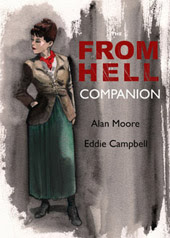
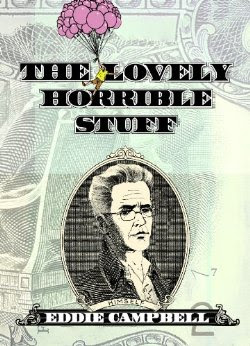

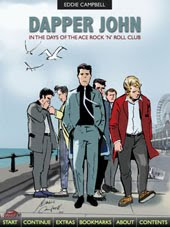
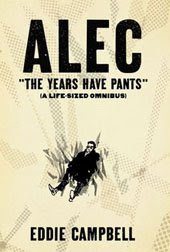
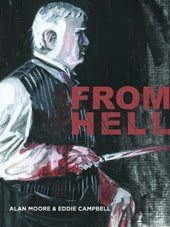
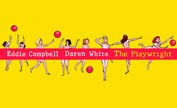
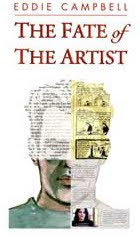
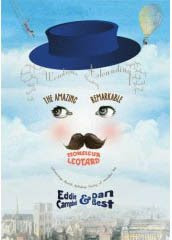

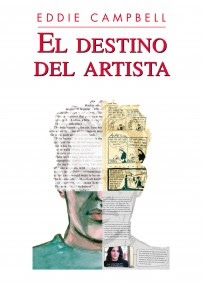
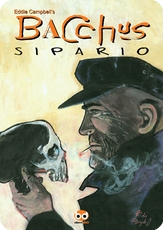
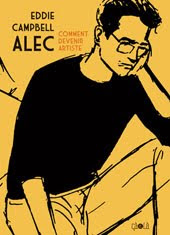

13 Comments:
I have only one book edited by Gelman, the Nostalgia collection of Gustave Verbeek's Upside Downs (soon to be made obsolete by the forthcoming Sunday Press collection). I've always been frustrated by these early collections of strip art because they're incomplete and seem haphazard in what's included. Case in point, The Dick Tracy Casebook (which Gelman had nothing to do with) which reprinted the dailies but left out the Sundays even though they were part of the narrative.
I guess I've been taking for granted that Gelman and company were pioneers, and that I might not be enjoying some of the more thorough presentations if it weren't for the efforts of people like Mr. Gelman who kept the flame alive.
You're a treasure, Eddie.
"The difference being that a trade is the collected version of a story previously published in an ongoing, maxi- or mini-series comic. Whereas graphic novels present an original story."
So, this tosser is saying that the Watchmen isn't an original story?
The confusion is coming from outside, too, Eddie -- as any reading or sampling of the plethora of academic writings about the conflated realm of graphic novels/collected comic books/collected comic strips/'wordless novels'/woodcut novels etc. quickly shows. This is pretty daunting stuff to the uninitiated, and maddening to the initiated and more maddening still to those who create in any one or more of these, uh, 'industries.'
For that matter, the use of terms like 'artform,' 'medium,' 'genre' etc. further confuses the whole hodgepodge beyond comprehension.
well, at least we agree it's 'confused beyond comprehension.'
Since I initiated the "It's not a graphic novel , percy' label, I have linked to reviews Insisting that the following books are not graphic novels: Watchmen (because it defaulted by coming out in parts), The Fate of the Artist (because it's not all in comic-strip form I'm guessing), The Arrival (because it doesn't have words and doesn't look like American comics), Alice in Sunderland (because it's a history book rather than a novel, apparently)...
Imagine if all the verbiage wasted on this naysaying had been diverted to the purpose of trying to say something wise and meaningful.
of course, the first 'Graphic Novel' - or at least called that - "Between Time and Again" by George Metzger, contained parts first published in newspapers.
And by this, Charles Dickens didnt write novels, he did collections in trade paperback?
sure, Steven, but time has proven that those arguments just go round and round ad nauseam (when I referred to Eisner, a thought in the back of my head was that generation Z probably think he and Dickens were contemporaries :) ). The challenge is to not end up arguing about things that don't matter, like the names for things. (though taking time to lampoon other people doing it, as per my post, probably amounts to the same crime, of which I have been accused in the past.) I instructed Top Shelf that the words 'graphic novel' (or graphic anything else) are not to appear anywhere in the vicinity of The Years have Pants (it didn't appear on Leotard either). I'm hoping that this tactic will help circumvent the baloney. It's terribly deflating to think that you have done something worthwhile and then some nit says, yes, but it's not comics (not a graphic novel, not Art etc.etc.). I'd prefer they stuck to 'dumb' or 'cool' which are at least honest and unpretentious assessments.
best to you
Eddie
"I'd prefer they stuck to 'dumb' or 'cool' which are at least honest and unpretentious assessments."
and useful information, which you can pass on to the marketing department.
Nice blog. I liked it.
Maybe if more people read actual, you know, novels, they'd have a better idea of the elements that comprise one.
But it does seem odd that comics is an art form (or is it a genre?) that continually has incredibly bad luck with terms, starting with "comics" itself. To borrow from Lady Bracknell: to have trouble with terminology once may be regarded as a misfortune, but to do so repeatedly looks like carelessness.
"But it does seem odd that comics is an art form"
or that comics is singular for that matter.
:)
(in case anybody thinks I was being serious)
This comment has been removed by the author.
I guess that makes the hardcover edition of Watchmen a "hardcover trade paperback". Glad that's straightened out, I'm certainly less confused. Thank you, Adam Relayson.
Post a Comment
Subscribe to Post Comments [Atom]
<< Home